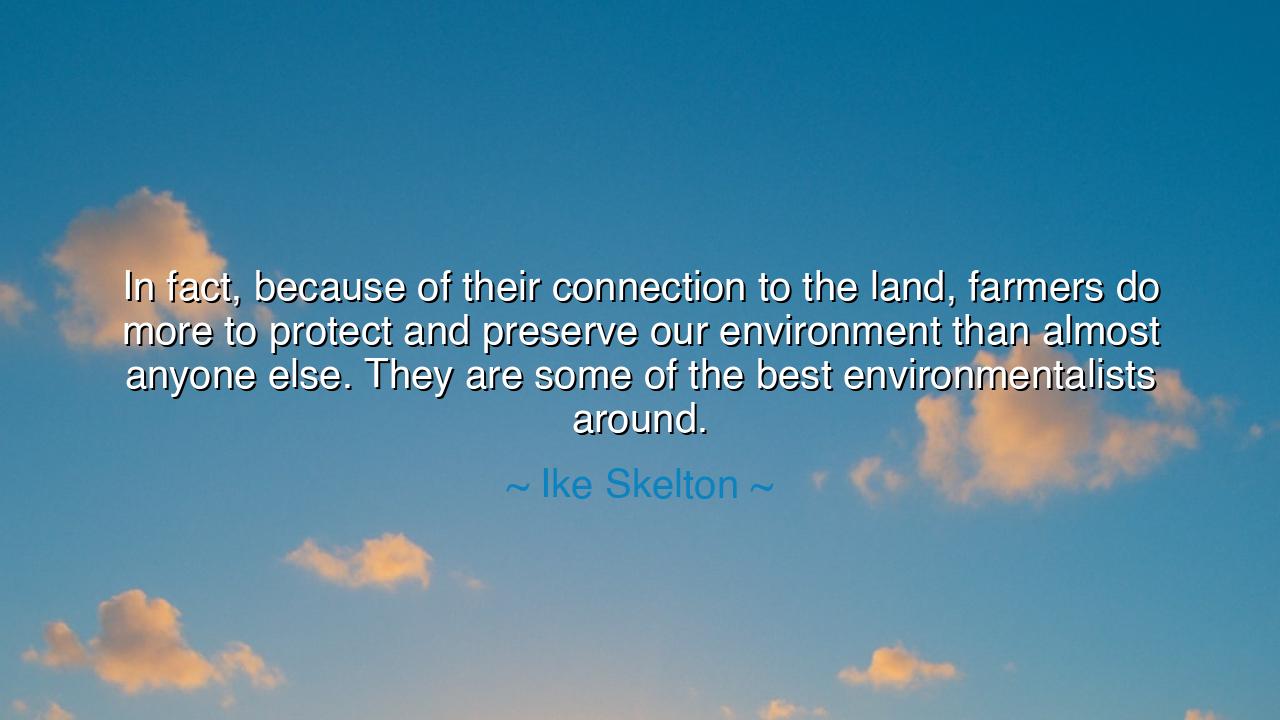
In fact, because of their connection to the land, farmers do more
In fact, because of their connection to the land, farmers do more to protect and preserve our environment than almost anyone else. They are some of the best environmentalists around.






In the old cadence of field and furrow, Ike Skelton speaks a plain but weighty truth: “Because of their connection to the land, farmers do more to protect and preserve our environment than almost anyone else. They are some of the best environmentalists around.” Hear the grain of wisdom in this: those who greet dawn with soil on their hands do not meet nature as a postcard, but as a partner. The weather is their daily scripture; the seasons, their stern but faithful teachers. To live by the harvest is to learn reverence, for no arrogance can compel seed to sprout or rain to fall.
The phrase connection to the land is not metaphor but covenant. A farmer knows the angle of a hillside by the way spring water lingers there, the temper of a field by the sound a boot sole makes after the first thaw. Such knowledge is not stored in books alone; it is hammered into memory by frost, written into the palm by shovel handles, and sung by wind through windbreaks. From this intimacy comes a craft of protection—terraces that slow the flood, cover crops that bind the soil, hedgerows that give wing and den to the small nations of birds and pollinators.
Let a lamp be lifted from history. When the Dust Bowl darkened the American plains, it was not the scholar’s ink but the farmer’s spade that first turned repentance into practice. Under the guidance of the new soil conservationists, families laid out contour plowing, planted shelterbelts, and returned prairie grasses to wounded ground. The lesson was costly, but clear: the land will forgive, if we preserve her with patience; she will not be commanded, but she can be courted. In time, black blizzards yielded to brown bread once more, because hands that had erred became hands that repaired.
So too across oceans and ages. Consider the mountain rice terraces that stair the hills of Luzon and Ifugao, or the stone-lined fields of the Mediterranean that sip scant rain instead of squandering it. These are not monuments; they are living arguments that human care can be an ally of earth’s design. The environment is not saved by sentiment, but by systems that fit the curve of the land and the hunger of the people, and by stewards who measure success in centuries, not quarters.
This is the deeper meaning of the oracle: the best environmentalists are often those whose livelihood depends on tomorrow’s fertility. To preserve is, for them, not an elective virtue but the logic of survival. They tend soil as one tends a library, knowing that every microbe is a syllable in the long poem of creation. They protect water because muddy wells sting first the lips of their own children. Their prudence is not timid; it is heroic in the modest way of those who show up every morning and do the right small thing again.
What, then, shall we learn and do? First, honor the stewards at our gates: buy from farmers who build soil rather than borrow it; prize rotations, pasture, and perennial roots. Second, bend policy toward husbandry: support extension services, soil-health incentives, and fair prices that reward good practice instead of cheap depletion. Third, become neighbors to the fields: volunteer in tree-plantings and stream restorations; help mend fence and plant cover; learn the names of the birds that return when hedges grow thick.
Carry this lesson like seed in your pocket: connection to the land breeds care, and care sustains the environment we all inhabit. Let your daily bread remind you that the earth’s future is kneaded by ordinary hands—calloused, patient, faithful. If you farm, keep learning the old-new arts: plant windbreaks, rest a weary pasture, give the soil green armor when the cash crop is gone. If you dwell in town, ally with those who keep the horizon alive: waste less, pay what food truly costs, and vote for the long view. Thus do we become—each in our place—companions to the farmers who already walk this narrow road, and thus do we protect and preserve what was given to us, so it may be given again.






AAdministratorAdministrator
Welcome, honored guests. Please leave a comment, we will respond soon